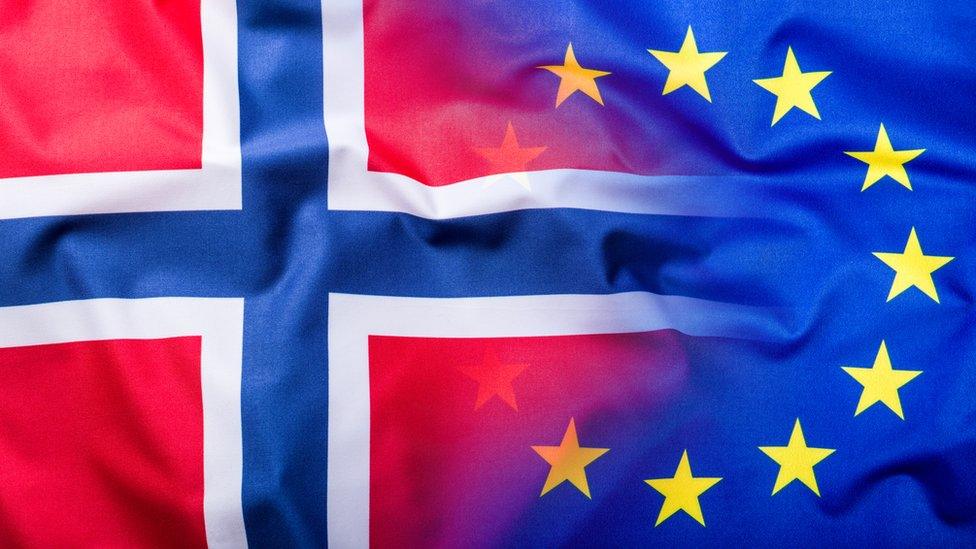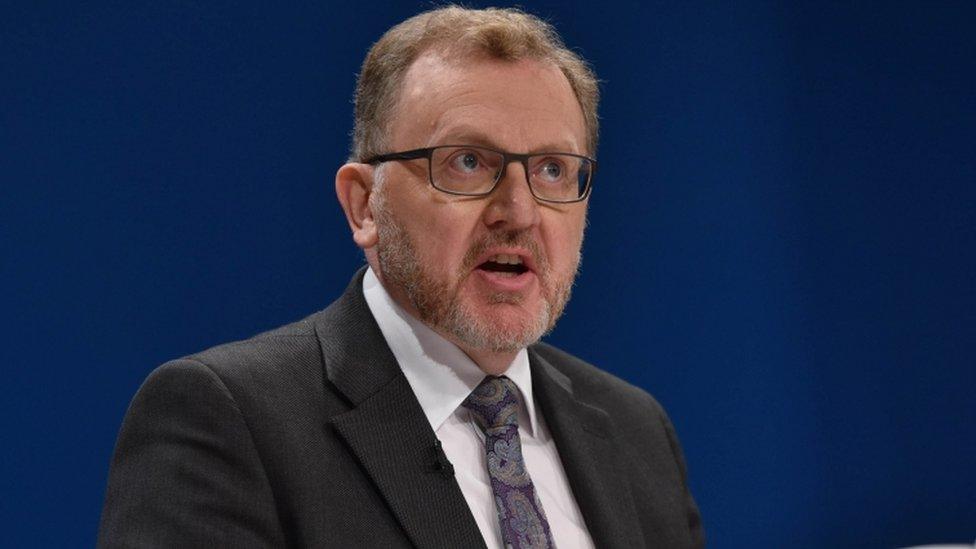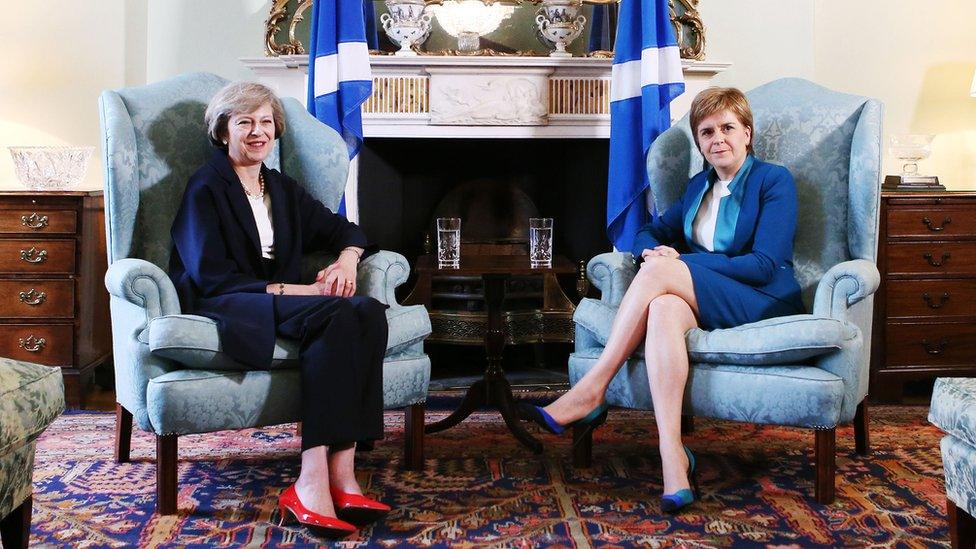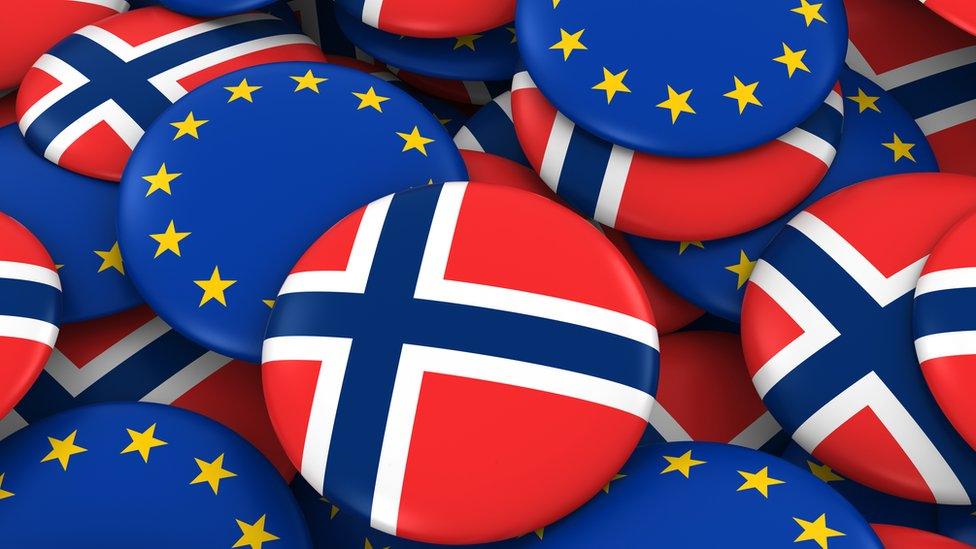Could Scotland follow the Norwegian model?
- Published

At Holyrood, MSPs were again talking Brexit. Quite rightly so, given the crucial importance of the issue. But in tonight's debate there was precious little entente - and the exchanges were decidedly less than cordiale.
Indeed at one point the Economy Secretary Keith Brown accused one of his Conservative opponents of "self-loathing".
To be fair, Mr Brown said it with perhaps a faint ghost of a smile upon his face.
But his point was plain. He was challenging the Tories - and other opposition parties - to back the Scottish government's insistence that Scotland's place in the EU single market should be "fully protected".
And the self-loathing? Mr Brown detected a tendency among his opponents to play down Scotland's potential to build and sustain international links.
Scepticism remains
In return, those opponents accused ministers of failing to supply any detail to back up their proposals re: the single market. Cue wry smiles on the SNP benches as they contemplated the machinations within the UK government.
Mr Brown says he wants to preserve, in effect, membership of the single market. His opponents have a question. How? Using what mechanism? The minister says detailed proposals will be published in a few weeks.
There remains scepticism. The Scottish Secretary David Mundell, giving evidence at Holyrood, said that leaving the EU meant leaving the single market.
This caused a temporary flurry when his comments were reported out of context - in which he stressed that every sinew would be exerted to sustain trade and economic links.
However, Mr Mundell was stating what he sees as a simple fact. No EU membership, no membership of the EU's creation, the single market.

One can perhaps replicate its values. One can seek to recreate its proclaimed gains. But UK membership of the single market as presently constituted will be no more.
So what might take its place? One option that is being seriously canvassed among those examining this issue is membership of the European Economic Area.
The EEA consists of the 28 existing EU member states - plus Iceland, Liechenstein and Norway. Those three added members have access to the four freedoms of the single market: goods, services, capital and people.
Those advocating such a plan say Scotland could allow EEA citizens to work here - in return for free movement for Scots.
Plenty of problems
They say further that people working in Scotland under this scheme could be clearly identified because Scotland has a distinctive tax code to reflect Holyrood's tax powers.
Now, let me emphasise a point I have been making all day. This is not, currently, a Scottish government proposal. It has not been endorsed by ministers. It is an option in the mix - but one with influential backing.
Problems? Plenty. Firstly, EEA members are currently all autonomous states, not devolved territories like Scotland.
Secondly, the UK - as the EU member state - would have to give prior approval to such a plan, even if it caught the interest of European institutions.
And, thirdly, UK ministers may take some persuading if they fear that EU/EEA citizens could gain access to the wider UK, through Scotland, post Brexit.

The UK government is likely to have major concerns about any proposals for a separate arrangement for Scotland
Remember that immigration and access was a primary driver in the Leave campaign in the first place.
Those now seeking to build a new system, post Brexit, may be less than enthralled by a scheme which, for Scotland, recreates free movement. They may not be inclined to accept the assurances offered.
Further, despite the talks between the Scottish and UK governments, there does not yet appear to be any overt enthusiasm in London for a distinctive Scottish deal.
Further still the Conservatives at Holyrood say there would be little point in seeking to recreate EU links if, in the process, trade with the rest of the UK were to be jeopardised.
Which, they say, would be the possible result of allowing EU/EEA access to Scotland but not rUK.
Scottish mandate
Scepticism is not confined to ministers. The Shadow Chancellor John McDonnell was asked about the prospect of a tailored deal for Scotland. He dismissed the notion, noting that various constituencies and regions had voted in a way which diverged from the UK pattern. There must be, he plainly believed, a UK solution.
Which brings us once more to a more fundamental issue. That of mandate. Mr Brown, as a nationalist, believes firmly in a Scottish mandate. He believes that Scotland is a nation, a signatory of the Treaty of Union and a would-be state in the making.
Those of a different persuasion believe in devolved governance for Scotland - but they believe, ultimately, in the endurance of the United Kingdom as a global political entity.
They may not, as some do not, favour the particular term "Unionist". But, albeit subject to further potential reform, they support the Union, with consequences for their views upon dealing with Brexit.
So are the SNP serious in seeking a solution within the ambit of the UK? Or are they setting these talks up to fail, as some rivals claim?
Both. I believe that ministers are genuinely examining what might be feasible within UK parameters. They are pushing the boundaries to see what might emerge. That is their Brexit strategy.
But, within this process, there is also an exit strategy. If the SG/UKG talks fail - at least, as judged by the Scottish government - then there remains, as ever in Scottish politics, the option of placing the prospect of independence once more before the Scottish people.
- Published15 November 2016
